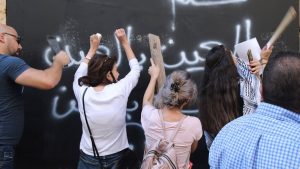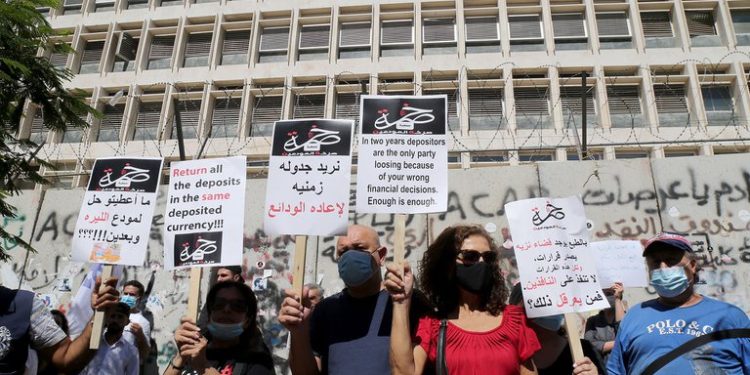By IWU-FI, 13 October 2021
(Picture 1: “Return all deposits in the same currency in which they were deposited” reads a sign at protests outside banks in Beirut EFE/EPA/NABIL MOUNZER)
In the last few days, thousands of people gathered at the doors of Lebanese bank branches to demand the return of the money they have deposited, which they could not access. Various media, including Infobae, have echoed the situation.
Since August 2019, Lebanon has been going through one of the worst economic and financial crises in its recent history. Aggravated by the COVID-19 pandemic and the explosion in the port of Beirut last year, where some 200 people died.

(Picture 2: Savers protest at bank branches withholding their deposits)
Millions of savers, mostly workers and pensioners, were severely affected by the Lebanese central bank’s decision to block access to their foreign currency accounts, prohibiting them from transferring their money abroad. The country’s currency (the pound) fell by 90 per cent. A “financial playpen” similar to the one experienced by Argentinians in 2001. Many small and medium-sized companies have also gone bankrupt, which has unleashed a wave of massive layoffs.
The devaluation of the national currency practically meant the disappearance of the savings of a lifetime of work. Savers with dollar accounts are only allowed to make withdrawals in Lebanese pounds at an exchange rate of 3,900 pounds to the dollar, while on the black market, this is quoted at up to 17,000 pounds. In real terms, this means an 80 per cent cut in the value of their savings.
According to various press agencies, including Reuter’s, the central bank is refusing to increase the rate for cash withdrawals until the government presents a comprehensive economic plan. In this context, the Lebanese government, through Prime Minister Najib Mikati, announced that talks will soon begin with the International Monetary Fund (IMF), which implies the implementation of an economic austerity plan, the consequences of which will fall on the Lebanese workers and people, who are already suffering from galloping inflation.
Besides the economic and financial crisis, Lebanon is facing a serious political crisis. Last September, an agreement was reached to form a new government, headed by Mikati. Since the days following the Beirut port explosion in August 2020, the country could not form a new government.
According to UN data reported by Infobae, 78 per cent of the Lebanese population lives below the poverty line. Meanwhile, 4 million of the country’s inhabitants are at risk of running out of drinking water.
From the International Workers’ Unity – Fourth International (IWU-FI) we support the Lebanese people in their struggle for the return of their savings, the savings of their work years. Nationalise the banks and reject the government’s plan to agree to an austerity plan with the IMF, which will mean more hunger, inflation and unemployment for the workers.













